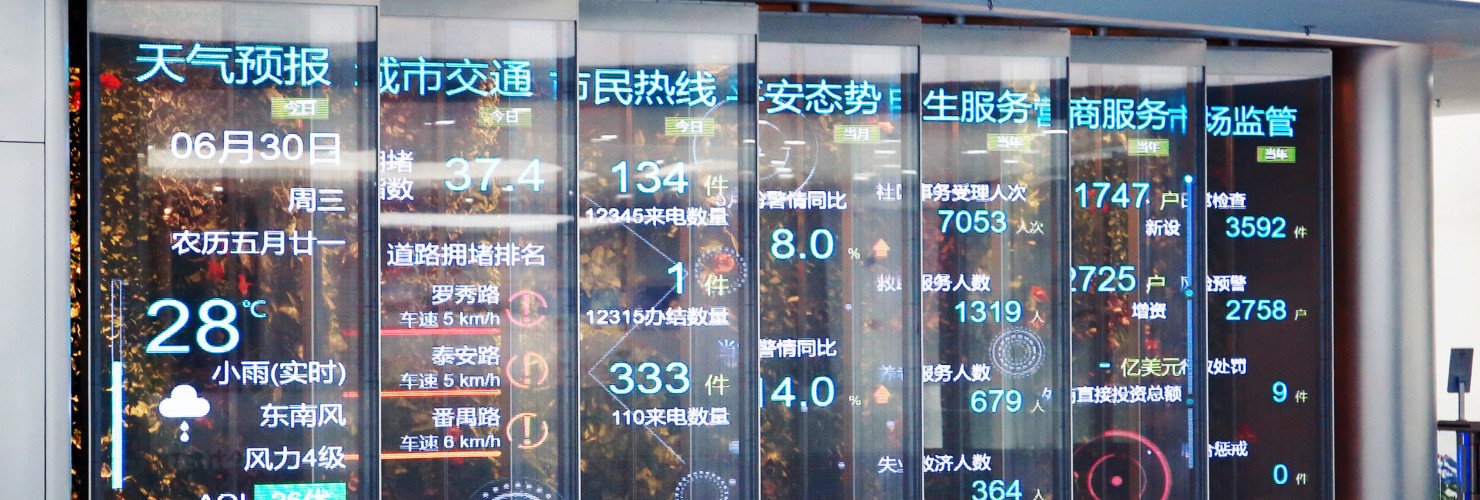

China activates data in the national interest
Beijing wants to create a data economy that prioritizes state sovereignty and localization. Rebecca Arcesati says it could have a big impact on Chinese and foreign companies.
This piece is the first part of a three-part series on data as a factor of production and a national resource in China, written by analysts in the MERICS Research Team on Science, Technology and Innovation Policies.
While the EU sees itself as a regulator of a free data market, China wants the state to play a much larger role in directing the circulation of data, which it views as a strategic national asset. To activate data as an economic and societal resource, China is creating state-backed data marketplaces – a way of bringing greater legal certainty to a chaotic market, but potentially also of pressuring private companies into sharing more of their data.
By 2025, it has been estimated, the world’s volume of data will reach 175 zettabytes (ZB), up from 33 ZB in 2018. Many jurisdictions are striving to unlock the economic and innovative potential of this data. In February, the European Commission proposed a new Data Act, while the Data Governance Act (DGA) is close to becoming law. In China, meanwhile, the Chinese Communist Party (CCP)’s Central Committee and State Council released important Opinions in April that call for accelerating the creation of a unified technology and data market.
From local experiments to integrated, supervised market
Data marketplaces in China are not new – local officials have been competing to offer solutions and gain national backing for a number of years. A big data exchange was launched in Guiyang in 2015, the first of over 30 such exchanges. These pilots have failed to meet expectations, as businesses lack the incentives and legal certainty to trade their valuable datasets via an intermediary platform. Without unified regulatory standards and operational norms for data validation, pricing, transactions, and security, these pilots have struggled to fulfil their objective.
Besides, decentralization does not sit well with Beijing’s growing scrutiny of data monopolies, leaks, abuses, and illegal activities. April’s Opinions call for institutional reforms in the areas of data-security certification and rights protection. Although the Data Security Law (DSL) backs the establishment of a “data exchange market” (数据交易市场)1, the premise is that data deemed sensitive for national security and the public interest should not be traded. That also includes personally identifiable information (PII), now enjoying stricter protection under the new Personal Information Protection Law (PIPL).
China’s data market recently entered a new phase of development, with major cities establishing their exchanges under strong central guidance. The Shanghai Data Exchange began trading (SDE) last November, following Beijing’s lead in March. Its website lists dozens of products ranging from traffic information to enterprise credit-ratings. Companies can register as members to buy and sell, but they can also make federated queries (i.e., consult datasets temporarily) or access services like data analysis, modeling, encryption, and desensitization.
Data industrial policy to unlock value for the nation
China’s leaders view control over data by government bureaucracies, state-owned enterprises and private firms as well as the persistence of “data silos” as market failures hampering economic development and efficient governance. This explains recent moves to break the data monopolies of internet companies like Jack Ma’s fintech giant Ant Group. The new exchanges are meant to facilitate the “orderly sharing of data” (数据有序共享) to increase productivity and public welfare. The assumption is that the market alone cannot match demand and supply, protect security and privacy, and realize the potential of data as a national resource.
For the CCP, data is a “factor of production” alongside land, labor, capital and technology.2 And China’s leaders believe that the “market-based allocation of factors” (要素市场化配置) cannot take place safely and efficiently if left unsupervised. In the “socialist market economy,” the state sees itself as the chief of data transactions. As tech researcher Lillian Li has noted, designating data as a production factor implies a belief that “data’s value to a nation is underpriced and currently subjected to market distortions.” The special attributes of data as a resource make it a form of semi-public good whose benefits may not accrue to society without government intervention.
China’s approach is best described as industrial policy for data. The 14th Five-Year Plan for National Informatization (2021-2025, Informatization FYP) attaches great importance to building governance structures, institutional mechanisms, and standards for optimizing the circulation and allocation of “data factors” (数据要素). It calls for research into and definition of data property rights, as well as systems for valuation, pricing, transaction tracing, security inspection, and dispute resolution.
Who does China’s data belong to?
But treating a virtual resource like data as a tradeable asset is easier said than done. Its sources run the gamut from people’s online searches to companies’ electricity consumption. Its value is decided more by its uses than its intrinsic quality. Who does the data belong to, and who can use, monetize, and even destroy it? How should it be priced?
Local experiments offer an indication of how China will grapple with these and other complex questions, serving as testing grounds for approaches that may be scaled nationwide. Pilots in the financial sector, for example, are incorporating blockchain and privacy computing to strengthen security and data protection. The SDE devotes special attention to trust and regulatory compliance – a review process ascertains that products listed on the platform exclude PII, trade secrets, or national-security relevant information, while the scope of use must be clearly delineated.
A thornier challenge for the government will be to persuade market actors to play along. A data property-rights regime was mooted in the 14th Five-Year Plan and would be a world first. The municipality of Shenzhen pioneered the definition of data rights in a draft regulation last year. It introduces the category of “public data,” or information “generated or processed by public management and service bodies while managing or serving the public.” Given Beijing’s penchant for collecting data from companies and individuals on vague public interest grounds, this approach to data as a public good will put businesses – Chinese and foreign – on alert.
A difficult balancing act
It seems that Chinese policymakers are trying to square a circle. Like their counterparts in Europe and elsewhere, they are seeking to balance security, privacy, and the smooth flow of data needed to stimulate economic growth and technological innovation. But China’s answer to this balancing act goes way beyond European efforts to promote trusted exchanges of personal and industrial data: the Informatization FYP makes clear that “liberating digital productive forces” requires the government to direct the market more vigorously, an ambition that is not without contradictions.
Ultimately, creating a state-led data economy is part of a strategy that treats data as a national asset, and hence emphasizes state sovereignty and localization. In line with the dual circulation strategy, China wants to prioritize and stimulate domestic circulation of data – and the algorithms, patents, information and other digital goods it underpins – while profiting from cross-border flows in a very controlled manner.
If it succeeds, such a strategy will have far-reaching implications, not only for China’s economic and technological future, but also for foreign actors’ participation in its booming data economy.
This piece is the first part of a three-part series on data as a factor of production and a national resource in China, written by analysts in the MERICS Research Team on Science, Technology and Innovation Policies. This series entails also the following short analyses:
Beijing’s watchful eye on all data flowing in and out of China by Kai von Carnap.
Oceans of data lift all boats: China’s data centers move west by Jeroen Groenewegen-Lau.
- Endnotes
-
1 | 交易can also be translated as “transaction”.
2 | The designation came during the Fourth Plenum of the 19th CCP Central Committee in October 2019, which formalized the party state’s new thinking about data and was followed, in April 2020, by an important CCP Central Committee and State Council guideline on improving the market-based allocation of factors. President Xi Jinping had referred to data as “a new production factor, a foundational and strategic resource and an important productive force” in December 2017.
